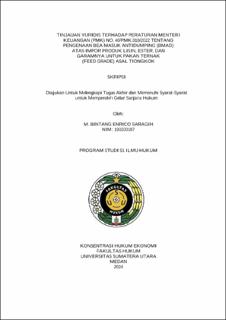| dc.contributor.advisor | Siregar, Mahmul | |
| dc.contributor.advisor | Lubis, Tri Murti | |
| dc.contributor.author | Saragih, M Bintang Enrico | |
| dc.date.accessioned | 2025-05-21T06:00:42Z | |
| dc.date.available | 2025-05-21T06:00:42Z | |
| dc.date.issued | 2024 | |
| dc.identifier.uri | https://repositori.usu.ac.id/handle/123456789/103961 | |
| dc.description.abstract | The imposition of Anti-Dumping Duties (ADD) represents a limited exception to the multilateral agreement on tariff elimination within the WTO. This exception is granted under WTO law to restore losses suffered by domestic industries due to dumping practices. This thesis aims to analyze the Indonesian Minister of Finance Regulation No. 40/PMK.010/2022 concerning the Imposition of Anti-Dumping Duties on Imports of Lysine, Esters, and Their Salts for Animal Feed (Feed Grade) originating from China. It explores issues surrounding anti-dumping regulation in international trade, the impact of dumping practices on both exporting and importing countries, and the relevance of imposing ADD on the import of lysine, esters, and salts for feed grade originating from China.
The methodology used is descriptive normative legal research, which refers to legal norms through a literature review to obtain secondary data in the form of primary, secondary, and tertiary legal materials relevant to the issues being studied. Data were collected using a literature review technique and analyzed using qualitative normative data analysis.
The results of this legal research indicate that anti-dumping regulation in international trade is governed by the World Trade Organization (WTO) through the General Agreement on Tariffs and Trade (GATT). In Indonesia, anti-dumping regulations are stipulated under Law No. 7 of 2014 on Trade and Government Regulation No. 34 of 2011. The impact of dumping practices on exporting and importing countries includes: for exporting countries, dumping may benefit domestic consumers by allowing lower product prices; however, it may also restrict domestic market sales, reduce investment in research and development, and close off markets to similar products from other countries. For importing countries, dumping practices can enhance downstream industry output and provide direct consumer benefits through lower product prices, although it may reduce profits for local producers. The relationship between the imposition of ADD on lysine, esters, and salts for animal feed imports and competition law lies in the fact that while ADD aims to protect domestic industries from dumping practices, it may create or strengthen monopolistic structures in the feed-grade lysine industry in Indonesia. | en_US |
| dc.language.iso | id | en_US |
| dc.publisher | Universitas Sumatera Utara | en_US |
| dc.subject | customs duties | en_US |
| dc.subject | anti-dumping | en_US |
| dc.subject | dumping | en_US |
| dc.subject | feed grade | en_US |
| dc.title | Tinjauan Yuridis terhadap Peraturan Menteri Keuangan (PMK) NO. 40/PMK.010/2022 Tentang Pengenaan Bea Masuk Antidumping (BMAD) Atas Impor Produk Lisin, Ester, dan Garamnya untuk Pakan Ternak (Feed Grade) Asal Tiongkok | en_US |
| dc.title.alternative | Juridical Review of The Minister of Finance Regulation (PMK) NO. 40/PMK.010/2022 Concerning The Imposition of Anti-Dumping Duties (ADD) on Imports of Lysine, Esters, and Their Salts for Animal Feed (Feed Grade) Originating from China | en_US |
| dc.type | Thesis | en_US |
| dc.identifier.nim | NIM190200187 | |
| dc.identifier.nidn | NIDN0020027303 | |
| dc.identifier.nidn | NIDN0012128603 | |
| dc.identifier.kodeprodi | KODEPRODI74201#Ilmu Hukum | |
| dc.description.pages | 119 Pages | en_US |
| dc.description.type | Skripsi Sarjana | en_US |
| dc.subject.sdgs | SDGs 16. Peace, Justice And Strong Institutions | en_US |


